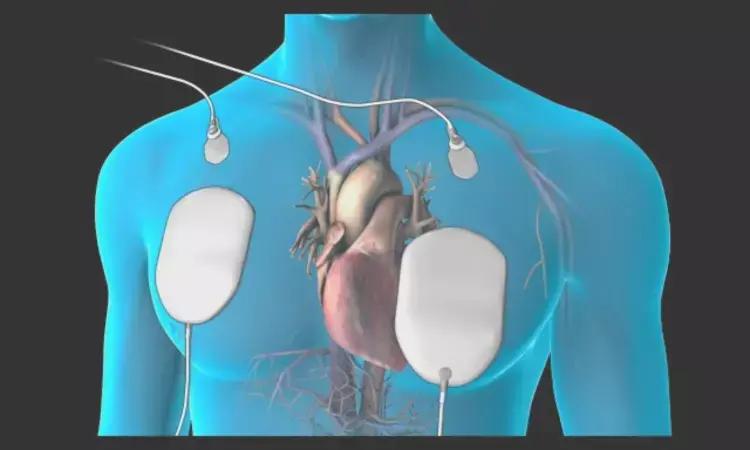
Electrode Position, AP Or AL, May Not Impact Success Rate Of Cardioversion Of AF
- byDoctor News Daily Team
- 18 February, 2025
- 0 Comments
- 0 Mins

USA: The success rate of direct current (DC) cardioversion of atrial fibrillation (AF) patients is not affected by whether the position of the electrode is anterior-posterior (AP) or anterior-lateral (AL), a meta-analysis of randomized clinical trials (RCTs) has shown.
The study results, published in the December 2022 issue of IJC Heart & Vasculature, imply that either AL or AP electrode positions should be acceptable for elective DC cardioversion of atrial fibrillation patients.
In clinical practice, atrial fibrillation is the most common cardiac arrhythmia. Direct current of AF is commonly indicated either on an elective basis in patients planned for rhythm control strategy or on an emergent basis for unstable patients. Hence, it becomes clinically essential to establish the safety and efficacy of cardioversion approaches.
Electrode and paddle positions, determining factors for the vector of DC cardioversion, have been proposed as critical in deciding procedure success. AP and AL electrode positions are the most common and most thoroughly studied. Several RCTs have evaluated the comparative efficacy of AP versus AL position during AF's cardioversion but have yielded mixed results.
Against the above background, Mennaallah Eid, Department of Internal Medicine, Lincoln Medical Center, New York, NY, United States, and colleagues conducted a meta-analysis and systematic review, including RCTs evaluating AP's efficacy versus AL electrode position in DC cardioversion of atrial fibrillation.
For this purpose, the researcher searched the online databases through March 2022 for randomized trials that assessed the outcomes of AP versus AL electrodes position during cardioversion. The study's primary outcome was the success rate of cardioversion (of atrial fibrillation).
The study led to the following findings:
10 RCTs were included in the final analysis, with 1677 patients.
No difference was seen in the successful cardioversion rate between the AP compared to the AL groups (86.6 vs. 87.9 %; RR 1.00).
No significant interaction between monophasic and biphasic waveforms was shown in the subgroup analysis by the shock waveform.
Meta-regression analyses demonstrated no effect modification of primary outcome according to left atrial diameter, body mass index, valvular heart disease, lone AF, or the duration of AF.
No significant difference was observed between the AP and AL electrode position groups in successful cardioversion at low energy (RR 0.94), the mean energy of the delivered shocks (standardizeS mean difference [SMD]−0.11), or the number of the delivered shocks (SMD −0.03).
Lower transthoracic impedance was seen with AP versus AL electrode position (SMD −0.28).
The researchers found no difference between the electrode positions AP and AL in the success rate of AF's cardioversion. Also, no differences were seen in success rate at low shock energy, mean energy, or the number of shocks needed for cardioversion between the AL and AP electrode positions.
"Either AL or AP electrode positions should be acceptable strategies for elective DC cardioversion of atrial fibrillation patients," the researchers concluded.
Reference:
Eid M, Abu Jazar D, Medhekar A, Khalife W, Javaid A, Ahsan C, Shabarek N, Saad M, Rao M, Ong K, Jneid H, Elbadawi A. Anterior-Posterior versus anterior-lateral electrodes position for electrical cardioversion of atrial fibrillation: A meta-analysis of randomized controlled trials. Int J Cardiol Heart Vasc. 2022 Oct 21;43:101129. doi: 10.1016/j.ijcha.2022.101129. PMID: 36304256; PMCID: PMC9593304.
Disclaimer: This website is designed for healthcare professionals and serves solely for informational purposes.
The content provided should not be interpreted as medical advice, diagnosis, treatment recommendations, prescriptions, or endorsements of specific medical practices. It is not a replacement for professional medical consultation or the expertise of a licensed healthcare provider.
Given the ever-evolving nature of medical science, we strive to keep our information accurate and up to date. However, we do not guarantee the completeness or accuracy of the content.
If you come across any inconsistencies, please reach out to us at
admin@doctornewsdaily.com.
We do not support or endorse medical opinions, treatments, or recommendations that contradict the advice of qualified healthcare professionals.
By using this website, you agree to our
Terms of Use,
Privacy Policy, and
Advertisement Policy.
For further details, please review our
Full Disclaimer.

Recent News
Normal-Tension Glaucoma Closely Associated With Co...
- 10 October, 2022
Air Pollution Tied To Increased Risk Of Premature...
- 24 May, 2023
NEET PG 2024: NBE Opens Pre-Final Edit Window
- 30 May, 2024
NMC Mulls Over Removal Of Upper Age Cap In MBBS En...
- 30 November, 2021

Daily Newsletter
Get all the top stories from Blogs to keep track.


0 Comments
Post a comment
No comments yet. Be the first to comment!